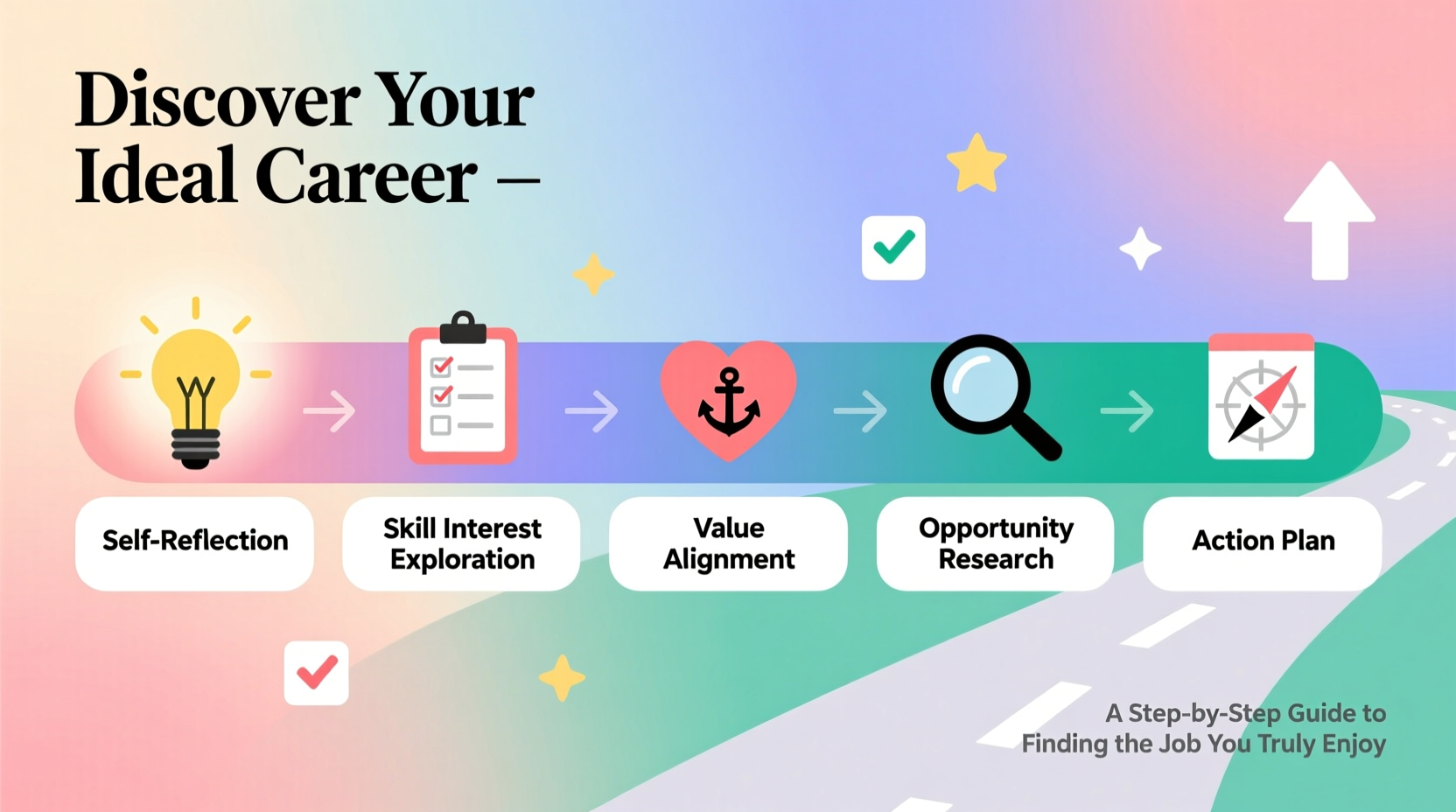Finding a job that feels meaningful, energizing, and aligned with who you are is one of the most impactful decisions you can make. Yet many people settle for roles that pay the bills but drain their enthusiasm. The truth is, your ideal career isn’t something you stumble upon—it’s something you discover through reflection, exploration, and intentional action. This guide walks you through a proven process to uncover work that doesn’t just sustain you financially, but fulfills you emotionally and intellectually.
Understand What Truly Matters to You

Your ideal career starts with clarity about what drives you. Money, stability, and prestige matter, but they rarely sustain long-term satisfaction. Instead, fulfillment comes from alignment: between your daily tasks and your core values, strengths, and interests.
Begin by reflecting on moments when you’ve felt most engaged in your work or activities. When were you so absorbed you lost track of time? What were you doing? Who were you helping? These clues point to intrinsic motivators—elements like autonomy, creativity, problem-solving, or service—that should form the foundation of your career path.
Core Values vs. Surface Preferences
It’s easy to confuse surface-level desires (e.g., “I want a remote job”) with deeper values (e.g., “I value flexibility and work-life balance”). Distinguish between the two by asking “why?” repeatedly. For example:
- I want a remote job → Why? → So I can manage my own schedule → Why? → Because I value autonomy and control over my time.
Autonomy becomes the real priority, not location.
“We don’t find fulfilling work by chasing titles or salaries. We find it by aligning our daily actions with what we deeply care about.” — Dr. Laura Kimpton, Organizational Psychologist
Assess Your Skills and Natural Strengths
Passion alone won’t sustain a career. It must be paired with capability. Take inventory of both hard skills (technical abilities like coding, writing, data analysis) and soft skills (empathy, leadership, communication).
Equally important are your natural strengths—the things you do effortlessly that others often praise. Maybe you’re great at simplifying complex ideas, calming tense situations, or spotting inefficiencies. These innate talents are often overlooked but can define your competitive advantage.
Skill Mapping Exercise
Create a simple chart to visualize where your passions and abilities intersect:
| Area of Interest | Skills I Have | Skills I Want to Develop |
|---|---|---|
| Environmental sustainability | Data analysis, report writing | Policy advocacy, project management |
| Teaching adults | Public speaking, curriculum design | E-learning platforms |
| Digital art | Illustration, branding | Animation, UX principles |
This exercise helps identify realistic career directions that leverage existing strengths while allowing growth.
Explore Real-World Opportunities
Theory only takes you so far. To discover what truly fits, you need exposure. Research industries, companies, and roles that align with your values and skills. But go further—talk to people who do the work.
Informational interviews are among the most underused yet powerful tools in career discovery. Reach out to professionals on LinkedIn or through networks and ask for 15–20 minutes to learn about their journey, challenges, and advice. Most people are happy to help when approached respectfully.
Mini Case Study: From Accounting to User Experience
Maya worked as a corporate accountant for eight years. She was good at her job but felt increasingly disconnected. After journaling about her peak experiences, she realized she loved organizing information in ways that helped others understand it—a strength she used during training sessions.
She researched careers involving visual communication and discovered UX design. Through informational interviews, she learned the field valued analytical thinking and empathy—skills she already had. She took online courses, built a portfolio, and transitioned into an entry-level UX role within a year. Today, she says, “I use the same part of my brain, but now I feel like I’m creating something that matters.”
A Step-by-Step Guide to Career Discovery
Follow this six-phase timeline to methodically explore and commit to a more fulfilling career path:
- Week 1–2: Self-Assessment – Complete values, interest, and strengths inventories. Use free tools like the VIA Character Survey or Holland Code assessment.
- Week 3–4: Research & Shortlist – Identify 3–5 career paths that match your profile. Read job descriptions, industry reports, and salary trends.
- Month 2: Network & Interview – Conduct at least five informational interviews. Ask: “What does a typical day look like?” and “What do newcomers often misunderstand about this field?”
- Month 3: Test the Waters – Enroll in a short course, attend a workshop, or take on a micro-project related to the field.
- Month 4: Evaluate Fit – Reflect on what energized or drained you during your explorations. Adjust your direction if needed.
- Month 5–6: Plan Transition – Update your resume, build a portfolio, and set a timeline for applying to roles or launching a side hustle.
Common Pitfalls and How to Avoid Them
Navigating a career change is rarely linear. Awareness of common traps can keep you on track:
| Pitfall | Do | Don't |
|---|---|---|
| Waiting for perfect clarity | Take small exploratory steps | Freeze because you “don’t know yet” |
| Chasing someone else’s dream | Define success on your terms | Compare yourself to peers or social media highlights |
| Fear of starting over | Reframe experience as transferable | Assume past roles were a waste |
FAQ
Can I really change careers later in life?
Absolutely. Many people successfully pivot in their 40s, 50s, and beyond. Employers value maturity, reliability, and diverse experience. Focus on transferable skills and demonstrate genuine curiosity and adaptability.
What if I don’t know what I’m passionate about?
Start by identifying what you’re not passionate about. Elimination is progress. Then experiment—try new hobbies, volunteer, take classes. Passion often follows engagement, not the other way around.
How do I explain a career shift in a job interview?
Frame it as evolution, not escape. Say, “I’ve spent years developing strong organizational and analytical skills. Now I’m channeling them into a field I’m deeply motivated to contribute to—like education technology.” Show intentionality.
Take Action Today
Discovering your ideal career isn’t about waiting for inspiration. It’s about making consistent, informed choices that move you closer to work that reflects who you are. You don’t need to quit your job tomorrow. But you can start today—by asking better questions, seeking real-world insights, and testing possibilities without pressure.
Every expert, innovator, or fulfilled professional once stood where you are: uncertain, curious, and ready to grow. Your ideal career isn’t hidden somewhere far away. It’s being built through the choices you make now.









 浙公网安备
33010002000092号
浙公网安备
33010002000092号 浙B2-20120091-4
浙B2-20120091-4
Comments
No comments yet. Why don't you start the discussion?